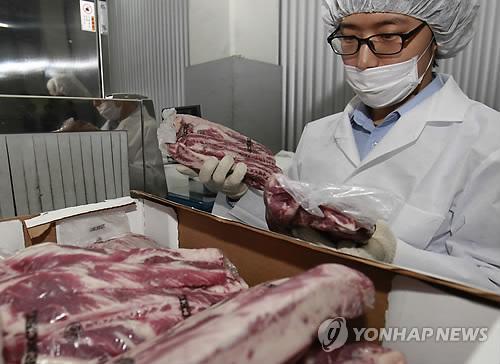Quarantine inspections are a key requirement U.S. beef shipments must undergo to receive customs clearance. Halting the process would therefore have the same effect as suspending imports because shipments would not be cleared to reach the local market even if they arrive at the country's ports.
The remarks by Park, a leading presidential hopeful, increased pressure on the government, which has come under criticism for deciding to continue imports of U.S. beef with strengthened quarantine inspections despite the recent confirmation of a case of mad cow disease in the U.S.
Government officials have said the current situation does not merit an all-out halt of quarantine inspections as the latest case involving a dairy cow is not directly connected to beef that comes under South Korea's import regulations. Public and political criticism has not died down, however.
"I think the government should halt quarantine inspections until we get definite information convincing enough to the people through epidemiological investigation, and should suspend imports altogether if a final analysis shows there is even a slight problem with safety," Park said during a visit to the southeastern city of Masan.
Park said the government should not give the public the wrong perception that it is more interested in avoiding trade friction with the United States than in the health and safety of its people.
"I don't know how long it will be (before an investigation into the latest mad cow case is completed), but wouldn't people be worried during that period?" Park said. "Therefore, it would be desirable to first halt quarantine inspections."
 |
American beef imports have long been a politically sensitive issue in South Korea.
South Korea resumed U.S. beef imports in 2008 after a five-year ban. The decision sparked months of anti-government rallies, seriously rocking the then fledgling government of President Lee Myung-bak, amid public perception his government endangered public health to curry favor with the U.S.
The government stressed at the time that the decision was based on scientific grounds.
South Korea only imports beef from animals younger than 30 months with all "specified risk materials" removed. Those materials are the parts considered capable of transmitting the variant Creutzfeldt-Jakob disease to humans. The disease is reported to have been responsible for about 150 deaths.
This week, opposition parties and other critics have accused the government of reneging on a 2008 promise to immediately ban imports in the event of a new mad cow outbreak in the U.S., citing an advertisement the government ran in newspapers at the time to ease public concern about the possibility of tainted meat imports.
In that, the government promised to immediately halt imports, scrutinize all shipments already in the country, send an inspection team to the U.S. and suspend serving beef at schools and military units if a fresh mad cow case occurred.
"There is nothing more important than the people's health," said the advertisement which was run jointly by the agriculture and health ministries. "The government will certainly protect (public health) without fail with responsibility."
The government rejected the accusations, saying the law on livestock disease was revised since that time to give the government more leeway in deciding whether to suspend imports, and a government statement issued after the advertisement said beef imports would be suspended if public health is considered to be at risk.
The main opposition also Democratic United Party (DUP) stepped up its attack on the government.
"The government should immediately halt U.S. beef imports and start renegotiations to restore our quarantine sovereignty," DUP leader Moon Sung-keun said, accusing the government of lying to the public.
Earlier in the day, Prime Minister Kim Hwang-sik said the government would swiftly inform the public of all information on the latest incident of mad cow disease in the United States and take all necessary steps.
Kim said the government will handle the issue based on "scientific and reasonable grounds," stressing that the latest case was discovered in a dairy cow older than 30 months.
"The government will release related information in a swift and accurate manner," he said.
Source: english.yonhapnews.co.kr
oldmarine
'Yonhap' 카테고리의 다른 글
| Ruling party`s upstart presidential contender seeks to change primary rules (0) | 2012.06.04 |
|---|---|
| Exit polls forecast majority win for ruling party (0) | 2012.06.04 |
| North Korea`s Botched Rocket Launch (0) | 2012.04.30 |
| `北 로켓 연료주입…내달 12∼13일 발사`(종합) (0) | 2012.03.29 |
| Lee says tough reaction to N. Korea`s provocations necessary for peace (0) | 2010.12.24 |